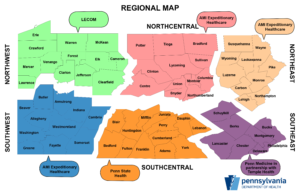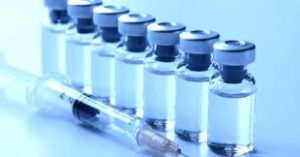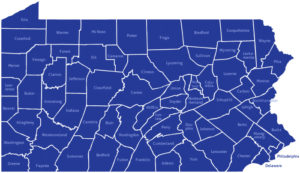PA Health Policy Update for the Week of January 24-28
The following is an update of selected state health policy developments in Pennsylvania for the week of January 24-28, 2022. (Some of the language used below is taken directly from state documents.)
 General Assembly
General Assembly
- The General Assembly enacted House Bill 253 (Act 2), providing $225 million in federal American Rescue Plan funding to support health care professionals on the frontlines of the COVID-19 pandemic in hospitals and behavioral health care facilities. The breakdown of the funding is as follows:
- $100 million for one-time payments to hospitals for making retention and recruitment payments to qualified staff.
- $110 million for one-time payments to behavioral health providers, critical access hospitals, and high Medical Assistance hospitals for making retention and recruitment payments to qualified staff.
- $15 million to be used by the Pennsylvania Higher Education Assistance Agency (PHEAA) to fund the Pennsylvania Student Loan Relief for Nurses Program.
A press release issued by Republican leaders of the General Assembly that quotes several health systems can be found here. A press released issued by Governor Wolf can be found here.
- The Senate passed Senate Bill 927, which expands eligibility for the Medical Officer Health Incentive Program. The bill was received in the House and referred to the Veterans Affairs & Emergency Preparedness Committee.
- The Senate Health and Human Services Committee convened this week and favorably reported the following bills.
- Senate Bill 152, which provides direction to the Department of Human Services on how to distribute funding intended for women’s health and family planning services.
- Senate Bill 956, a constitutional amendment that clarifies that there is not a right to an abortion or abortion funding in the state constitution.
- House Bill 1420, which directs the Department of Human Services to establish a public awareness campaign to provide information about the programs and services available for first responders, health care workers, and other frontline workers suffering from mental health issues related to the COVID-19 pandemic.
- The Senate Aging and Youth Committee favorably reported the following bills this week.
- Senate Bill 936, which mandates the reporting and tracking of infants born with an addiction to opioids or other illegal substances.
- House Bill 996, which requires the departments of Human Services and Health to establish protocols to permit residents of long-term-care facilities to receive visits by a member of the clergy during a disaster emergency.
- House Bill 1737, which enables a county children and youth agency to petition the court for an order to compel a drug screening when there is evidence that substance use may be a contributing cause of child abuse or neglect.
- The House Professional Licensure Committee convened and favorably reported the following bills this week.
- House Bill 19, which establishes professional licensure for behavioral analysts.
- House Bill 1440, which provides for the regulation and licensure of medical imaging and radiation therapy professionals.
- House Bill 1862, which preserves the COVID-19 regulatory waiver that authorizes physicians with an institutional license in a teaching hospital to serve patients at more than just two facilities in a health system.
 Department of Human Services
Department of Human Services
- The Department of Human Services (DHS) has mailed letters to hospitals potentially eligible for FY 2021-22 OB/NICU DSH payments requesting verification of their current licensure status. Courtesy electronic notification also was sent to contacts on file on January 26. To verify that they meet the criteria for inclusion in the payment program, hospitals must sign and return the attestation form to RA-pwdshpymt@pa.gov by Friday, 2/25/22. Any Pennsylvania hospitals that are currently licensed to provide obstetric or neonatal services and did not receive a notification should contact DHS at RA-pwdshpymt@pa.gov.
- DHS has issued a Medical Assistance Bulletin to inform pharmacies of the addition of procedure code S5001 to the Medical Assistance Program fee schedule for dispensing oral antiviral treatments with FDA emergency use authorization for the treatment of COVID-19
and providing instructions for pharmacies on how to submit claims for dispensing these treatments. Learn more in this Medical Assistance Bulletin. - DHS has announced that it will add Aduhelm (aducanumab) and complement inhibitors to the Medical Assistance Program’s list of services and items requiring prior authorization.
- DHS has published its latest “Monthly Physical Health Managed Care Enrollment Report.” The new report includes the first look at October 2021 Medicaid managed care enrollment data.
 Department of Health
Department of Health
- The Department of Health (DOH) has posted a notice on its message board that it will provide direct access to COVID-19 therapeutics to residents of long-term-care facilities. With the recent approval of oral antiviral medications for COVID-19 (Pfizer’s Paxlovid and Merck’s molnupiravir), DOH is holding product in strategic reserve for residents of long-term-care facilities and others in congregate care settings. Paxlovid and molnupiravir are authorized for use in individuals who test positive for COVID-19 and are at high-risk for severe disease progression. Upon receipt of a request for medication, supply permitting, DOH will ship the product the same day or the next day to the requesting facility. Due to the nature of the medications, this product is only appropriate for residents within five days of the onset of symptoms. Go here to request these oral antiviral medications from DOH.
- DOH has issued an update of its recommendations for return to work for health care workers with confirmed or suspected COVID-19.
- DOH has updated its guidance on work restrictions for health care workers who have been exposed to COVID-19.
- DOH has announced changes to hospitalization data reporting on its Corvena platform to align with federal reporting requirements. The new data fields must be completed beginning February 2 and daily thereafter. Click here to download a Word file announcing these changes and download the Corvena data dictionary here (Excel).
- DOH has deployed the first state-directed health care strike team to Grand View Health in Bucks County. The team includes 10 registered nurses provided through GHR Healthcare under a contract with the Department of Health. Learn more about the strike team concept and how it works and what this group will do at Grand View Health in this Department of Health news release.
- DOH has introduced two new resources to help skilled nursing facilities encourage their residents and staff to receive COVID-19 vaccines and boosters: a document on best practices and a vaccine and booster fact sheet.
- DOH has adopted the new federal CDC standard for blood lead reference value (BLRV) from 5 μg/dL to 3.5 μg/dL. The department explains why it adopted this new standard and what it means in this health advisory notice.
COVID-19: By the Numbers
- Daily COVID-19 case counts remain very high but fell significantly over the past week. Pennsylvania’s seven-day average yesterday (January 27) was 14,025 cases a day; a week ago (January 20) its seven-day average was 20,958 cases a day.
- The number of new COVID-19-related deaths also remains very high and it rose over the past week. Pennsylvania’s seven-day average yesterday (January 27) was 166 deaths a day; a week ago (January 20) its seven-day average was 120 deaths a day.
- The Department of Health reports that 27.8 percent of all staffed adult ICU beds are COVID-19 patients, down from 31.8 percent last week, and 31.3 percent of all ventilators state-wide are in use, down from 32.4 percent last week.
- All 67 Pennsylvania counties continue to experience a high rate of COVID-19 transmission.
- The decline in the number of new COVID-19 cases is reflected in a 9.9 percent decline over the past week in the number of Pennsylvanians hospitalized with the virus. The number of people on ventilators fell 15.1 percent over the past week and the number in ICUs fell 19.7 percent.
- Media reports are mixed but suggest reason for optimism. Around the state,
- The number of new COVID-19 cases has reportedly dropped by nearly half in Allegheny County.
- COVID-19-related hospitalizations have fallen in Lancaster County.
- On the other hand, Pennsylvania prisons have stopped permitting visitors because of staff shortages.
- The state’s nursing homes are still struggling to get their employees vaccinated.
 Stakeholder Events
Stakeholder Events
Medical Assistance Advisory Committee – Managed Long-Term Services and Supports Subcommittee – February 2
The DHS Medical Assistance Advisory Committee’s managed long-term services and supports subcommittee will meet virtually on Wednesday, February 2 at 10:00 a.m. Interested parties can join the meeting here or call in at 914-614-3221, access code 300-175-489.
Organ Donation Advisory Committee – February 3
The Organ Donation Advisory Committee will hold a virtual public meeting on Thursday, February 3 from 10 a.m. to 1:30 p.m. The purpose of this meeting is to review progress in the area of organ and tissue donation in Pennsylvania, recommend education and awareness activities, recommend priorities in expenditures from the Organ and Tissue Donation Awareness Fund, and advise the acting secretary on matters relating to the administration of this fund. Learn more about the meeting and how to participate in this Pennsylvania Bulletin notice.
Office of Long-Term Living – Financial Management Services Stakeholder Meeting – February 4
The DHS Office of Long-Term Living’s financial management services stakeholder group will hold a virtual public meeting on Friday, February 4 at 1:00 p.m. to discuss upcoming changes for the administration of financial management services under the Community HealthChoices, OBRA Waiver, and Act 150 programs. Go here to participate or join by phone at 1-408-418-9388.
Traumatic Brain Injury Advisory Board – February 4
The Traumatic Brain Injury Advisory Board will hold a virtual public meeting on Friday, February 4 at 10:00 a.m. For information about the board, the meeting, and how to participate, see this Pennsylvania Bulletin notice.
Public Health Advisory Council – February 7
The Public Health Advisory Council hold a virtual meeting on Monday, February 7 at 11:30 a.m.
to discuss the Preventive Health and Health Services Block Grant work plan. The meeting will be held by phone. For information about how to participate, see this Pennsylvania Bulletin notice.
Human Immunodeficiency Virus Community Prevention Planning Committee – February 16 and 17
The Statewide HIV Planning Group will hold virtual public meetings on Wednesday, February 16 and Thursday, February 17, 2022 from 9:00 a.m. to 4:30 p.m. Learn more about the meetings and how to participate from this Pennsylvania Bulletin notice.
 The Wolf administration has announced the creation of the Long-Term Care Resiliency, Infrastructure Supports, and Empowerment program, or LTC RISE, which seeks to give long-term-care facilities “…the support they need to battle COVID-19, recover, and rebuild.” Under the program, long-term-care facilities can pursue improvement projects in the areas of infection prevention and control and emergency preparedness; building a sustainable outbreak response operation; and promoting professional development and a resilient long-term-care facility workforce. The program is funded by a federal grant and replaces the state’s Regional Congregate Care Assistance Teams program, which expired at the end of 2021. Learn more about LTC RISE from
The Wolf administration has announced the creation of the Long-Term Care Resiliency, Infrastructure Supports, and Empowerment program, or LTC RISE, which seeks to give long-term-care facilities “…the support they need to battle COVID-19, recover, and rebuild.” Under the program, long-term-care facilities can pursue improvement projects in the areas of infection prevention and control and emergency preparedness; building a sustainable outbreak response operation; and promoting professional development and a resilient long-term-care facility workforce. The program is funded by a federal grant and replaces the state’s Regional Congregate Care Assistance Teams program, which expired at the end of 2021. Learn more about LTC RISE from  Governor Wolf announced that the state is organizing regional support sites for both hospitals and long-term-care facilities and strike teams to support hospitals facing staffing shortages. The effort, to be coordinated by the Department of Health and the Pennsylvania Emergency Management Agency, will include the following major components:
Governor Wolf announced that the state is organizing regional support sites for both hospitals and long-term-care facilities and strike teams to support hospitals facing staffing shortages. The effort, to be coordinated by the Department of Health and the Pennsylvania Emergency Management Agency, will include the following major components: CMS directed state survey agencies in certain states, including Pennsylvania, to begin surveying for compliance with the agency’s November 5, 2021 final rule requiring vaccination of health care staff.
CMS directed state survey agencies in certain states, including Pennsylvania, to begin surveying for compliance with the agency’s November 5, 2021 final rule requiring vaccination of health care staff.  COVID-19: By the Numbers
COVID-19: By the Numbers


 State Revenue Update
State Revenue Update  Department of Drug and Alcohol Programs
Department of Drug and Alcohol Programs General Assembly
General Assembly Around the State
Around the State
